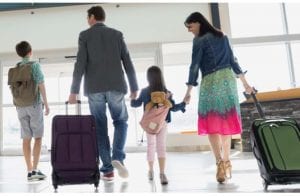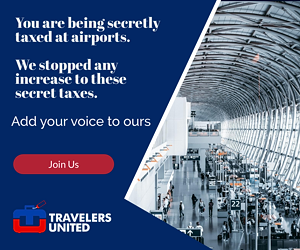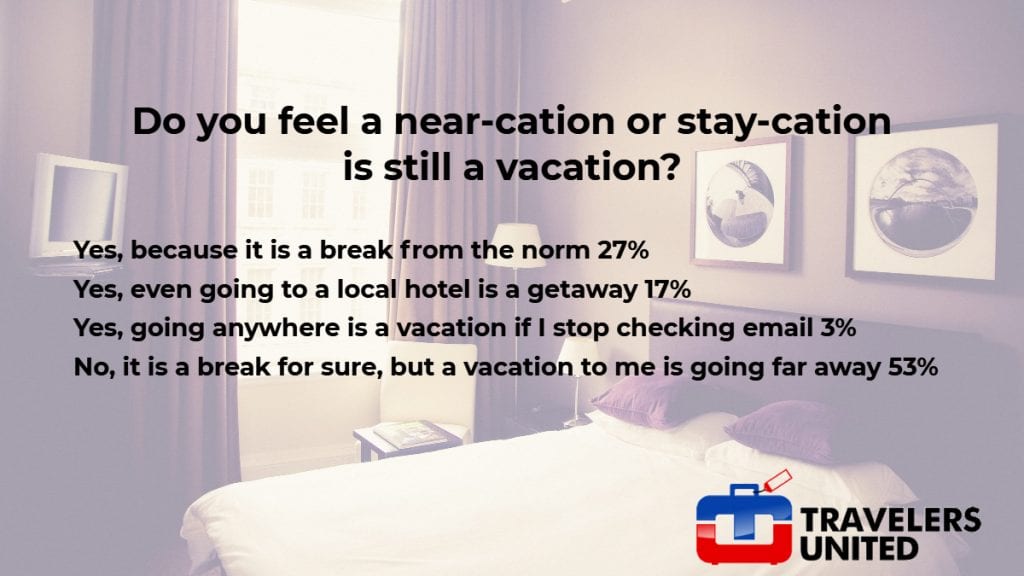Americans desire to travel. They do not want staycations.
Last week’s Travelers United poll underscored America’s desire to travel. Indeed, it seems that reports of the death of travel are greatly exaggerated. Staycations, nearcations, and such just aren’t satisfying for many travel junkies. More than 50 percent of those polled by Travelers United said, “a vacation to me is going far away.”
Americans as travelers are longing to get back in planes and traverse continents. More than half of Americans long to fly over oceans, tramp through Europe, go on safaris, wander through jungles, and experience other cultures. The Travelers United poll found only 27 percent saying that they take nearcations and staycations just for a break from the norm of pandemic isolation.
Seventeen percent said that even going to a hotel was a getaway. And, 3 percent claimed a vacation day was one where they never checked email.
The lack of international travel eliminates lots of vacation choices.

This recent Travelers United poll is a clear signal that the American people love to travel. Across the planet, people from myriad countries want more than staycations. Countless personalities want to travel to visit grandparents, families, children, and grandchildren. Travelers all recognize, after about six months of pandemic rules, that video meetings do not share the joy of being with a loved one or of hugging another human being.
We know that moving grapes and fruits from South America across the Pacific and Atlantic Oceans is normal in our international system. We need iPhones manufactured in China and India with parts from the US and a score of countries to speak with loved ones across the world. Flowers from Ethiopia and Kenya decorate tables across Asia and in Europe.
We are a world of nations that have learned the isolation and lockdowns are not the real answers. But, travel and interpersonal connections are the lifeblood of our world’s economic circulation. Travel makes us human. Whether it is across a nearby border or a long journey, travel defines us and it creates our world.
Travel is not going to disappear. It will restart and thrive again.

If we follow the three golden rules that we all learned at the beginning of this pandemic, we will survive to travel again. Plus, we will give human ingenuity a chance to catch up with the damage that a widespread virus will wreak. And, humans will prevail over inanimate pathogens.
- Wash your hands.
- Wear masks when in crowded situations.
- Maintain social distance.
Pandemic relief will focus on our humanity
Mankind will not be served by splintering into separate tribes when it comes to dealing with viruses and pathogens. We must work together. We can compete, but interactive competition will be what sets humans apart from things. The changes wrought by these changes will be difficult and economically painful for many industries. But, they will be temporary.
Airlines must rebuild themselves. They must become more responsive to their passengers and less dependent on algorithms. International travel, though we long for it, will not return immediately. The formerly large network carriers will have to learn from the nimble, smaller, low-cost carriers. However, we know that travel will return. The question is when. And, in how much time.
All portions of the travel industry are looking at better cleaning and sanitizing systems. Airlines to customs and border protection have learned this lesson. Hotels and restaurants are searching for changes. And, bars and cafés are trying to figure out how to allow intimacy and safety. All mini-stakeholders in our travel networks will face necessary changes.
READ ALSO ON TRAVELERS UNITED BLOG:
Should you book travel now for 2021?
Will my hotel life be better or worse after the pandemic?
International cooperation rather than battles will be more important
If the insights garnered from a small poll of American attitudes together with worldwide anecdotal evidence is to be believed, civilization will prevail. And, the world will change. The greatest lesson of this pandemic will be the need for human contact and international cooperation. Hopefully, that will come sooner rather than later as our planet emerges from the disaster of COVID-19.

Charlie Leocha is the President of Travelers United. He has been working in Washington, DC, for the past 14 years with Congress, the Department of Transportation, and industry stakeholders on travel issues. He was the first consumer representative to the Advisory Committee for Aviation Consumer Protections appointed by the Secretary of Transportation from 2012 through 2018.




